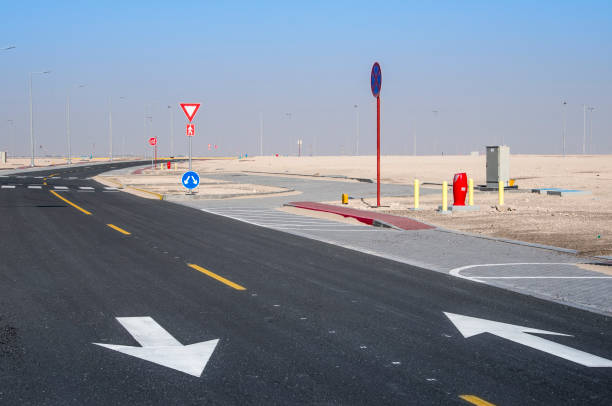Road safety is a paramount concern in the United Arab Emirates (UAE), a nation known for its commitment to innovation and excellence in infrastructure development. A crucial element in enhancing road safety is the strategic deployment of road barriers in UAE. These barriers serve as vital tools in preventing accidents, guiding traffic, and protecting both motorists and pedestrians. In this comprehensive exploration, we delve into the pivotal role played by Road barriers in UAE , emphasizing their multifaceted significance in safeguarding lives and infrastructure.
Ensuring Safe and Efficient Roads
The UAE’s rapid urbanization and the continuous expansion of its road networks necessitate robust safety measures. Road barriers, often made from high-quality materials such as concrete, steel, or plastic, serve as silent sentinels along highways, urban streets, and construction zones. Their primary objective is to channel traffic, prevent vehicle intrusion into prohibited areas, and minimize the severity of accidents.
Addressing Diverse Road Hazards
UAE roads encounter a range of challenges, from the relentless heat of the desert to sudden sandstorms and heavy rainfall. Road barriers are engineered to withstand these challenges, providing stability and reliability in various environments. They are equally adept at safeguarding against both minor accidents, such as a vehicle drifting off the road, and major collisions that involve multiple vehicles.
Protecting Pedestrians and Workers
Road safety extends beyond motorists. Pedestrians and road construction workers are vulnerable road users who benefit significantly from the presence of road barriers. Barriers serve as protective shields, preventing unauthorized access to construction zones and ensuring the safety of those working alongside busy roads.
The Role of Road Barriers in the UAE
Prevention of Accidents
Accidents on highways and urban roads can have devastating consequences. Road barriers play a pivotal role in preventing vehicles from veering off the road, especially on sharp curves or areas prone to drifting sand. They act as a physical barrier, absorbing the impact and redirecting the vehicle back onto the road, often preventing rollovers and serious accidents.
Traffic Management
Efficient traffic management is essential in a country with a diverse population and a constant influx of tourists. Road barriers help regulate traffic flow, especially during peak hours or major events. They guide drivers, prevent lane changing in unsafe zones, and provide a sense of order on the road.
Protection During Construction
The UAE is renowned for its continuous construction projects. Whether it’s a new skyscraper or a highway expansion, construction zones are common sights. Road barriers in UAE are critical in these areas, delineating safe zones for workers and preventing accidents caused by distracted or speeding drivers.
Adapting to Weather Conditions
Extreme weather conditions are a reality in the UAE. Sandstorms, heavy rain, and fog can significantly reduce visibility and road traction. Road barriers, strategically placed, guide drivers even in adverse conditions, preventing accidents and ensuring that roads remain safe regardless of the weather.
Frequently Asked Questions
Q1: What types of materials are used in road barriers in the UAE?
A1: Road barriers in the UAE are typically made from materials like concrete, steel, and plastic. The choice of material depends on the specific requirements and location of the barrier.
Q2: How are road barriers maintained in the UAE’s harsh climate?
A2: Road barriers in the UAE undergo regular maintenance to ensure their effectiveness. This includes inspections, repairs, and, if necessary, replacement of damaged barriers due to weather or accidents.
Q3: Are road barriers in the UAE designed to withstand extreme heat?
A3: Yes, road barriers in the UAE are engineered to withstand the country’s extreme heat. They are designed to maintain their structural integrity even in high temperatures.
Q4: Are there specific regulations governing the installation and use of road barriers in the UAE?
A4: Yes, the UAE has specific regulations and standards for the installation and use of road barriers to ensure road safety and compliance with international best practices.
Q5: How can road barriers improve road safety for pedestrians?
A5: Road barriers provide a physical barrier between pedestrians and vehicular traffic, enhancing pedestrian safety by preventing accidental vehicle encroachments into walkways and crossings.
Conclusion
In the UAE, the commitment to road safety is a testament to the nation’s dedication to protecting its residents and visitors. Road barriers, often taken for granted, are integral components of this commitment. They silently stand guard on highways, urban streets, and construction sites, offering protection against accidents, guiding traffic, and preserving the safety of pedestrians and workers. As the UAE continues to grow and innovate, the role of Road Barriers in UAE safeguarding lives and infrastructure remains indispensable. Road barriers are not just static structures; they are dynamic guardians of safety, contributing significantly to the nation’s reputation for excellence in road infrastructure and safety standards.

